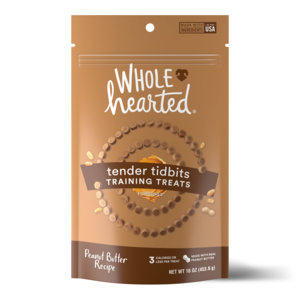WholeHearted Soft & Chewy Training Treats Peanut Butter Recipe Review


PawDiet has been helping pet owners since 2015. To fund our efforts, articles may include affiliate links; if you buy something through a link, we may earn a commission.
Review of WholeHearted Soft & Chewy Training Treats Peanut Butter Recipe
According to our most recent data, this product is intended for intermittent or supplemental feeding only.
Review of Ingredients
In our review of WholeHearted Soft & Chewy Training Treats Peanut Butter Recipe, we'll examine all 16 ingredients and highlight the nutritional contribution of each ingredient.
While the first few ingredients typically dominate the recipe's composition, ingredients in small quantities can still have a meaningful impact on the overall nutritional profile of the recipe.
Dry roasted peanuts are a great source of protein, healthy fats, and various vitamins and minerals that support your dog's energy levels, muscle development, and overall health.
Hydrogenated cottonseed oil is a source of essential fatty acids which promote a healthy coat and skin.
Hydrogenated rapeseed oil is used as a source of fats in dog food, which are essential for providing energy, supporting cell function, and promoting skin and coat health.
While salt is a necessary component of a dog's diet, providing essential minerals such as sodium and chloride for proper cellular function, it should be provided in moderation to avoid health issues like hypertension or kidney damage.
Tapioca starch is a grain-free carbohydrate source derived from the root of the cassava plant. It is used in dog food as a binding agent and energy source. Tapioca starch is easily digestible, making it a suitable ingredient for dogs with sensitive stomachs or grain allergies.
Dried chickpeas are an excellent source of plant-based protein and fiber, helping to maintain a healthy digestive system and build strong muscles in dogs.
Pea flour is a gluten-free source of carbohydrates and protein that offers an alternative to grains for dogs with sensitivities. It is also rich in dietary fiber, which supports digestive health and helps maintain a healthy weight.
Vegetable glycerin is used as a natural sweetener and texture enhancer in dog foods.
Gelatin is a natural source of collagen, which helps maintain healthy joints and promotes a shiny, healthy coat for your dog.
Lecithin is a naturally occurring fatty substance that can help support your dog's overall health. It plays a crucial role in maintaining cell membrane integrity and provides essential fatty acids for a healthy coat and skin. Additionally, lecithin aids in fat digestion and absorption, promoting optimal nutrient utilization.
Citric acid is a natural preservative that helps maintain the freshness and quality of dog food. It also acts as an antioxidant, which can help protect your dog's cells from damage caused by free radicals.
Lactic acid is used in pet foods as a preservative and to enhance flavor.
Caramel color is a natural coloring agent used to enhance the visual appeal of the dog food without impacting its nutritional value.
Mixed tocopherols are natural antioxidants used to preserve the freshness of dog food, ensuring your pet receives the highest quality nutrients possible.
Rosemary extract is a natural antioxidant that can help protect your dog's body from the harmful effects of free radicals. It also has anti-inflammatory properties, which can support your dog's overall health and well-being, particularly in regard to joint health.
Natural peanut butter flavor is a dog-approved, delicious flavor that enhances the taste of your dog's food. This natural ingredient is free of artificial additives, making it a healthy choice for your furry friend's taste buds.
Review of Guaranteed Analysis
The crude protein content of at least 14.00% in the WholeHearted Soft & Chewy Training Treats Peanut Butter Recipe is likely contributed by the dried chickpeas, pea flour, and gelatin. Chickpeas and peas are known to be good plant-based sources of protein, while gelatin, which is derived from animal collagen, is a form of protein as well. The peanut butter may also add to the protein content, but to a lesser extent compared to the chickpeas and pea flour.
Crude fat content is at a minimum of 5.00%. This is most likely coming from the peanut butter, which contains natural oils from dry roasted peanuts, as well as the additional hydrogenated cottonseed and rapeseed oils that are included in the peanut butter ingredient. These oils are high in fat and would contribute significantly to the overall fat content of the treats.
The maximum crude fiber content of 3.00% suggests that there is a modest amount of fiber in the treats. This could be provided by the dried chickpeas and pea flour, both of which contain dietary fiber. Tapioca starch, while not a significant source of fiber, might contribute a small amount to the total fiber content as well. The fiber content is kept relatively low, which is suitable for a treat that is meant to be easily digestible for training purposes.
The remaining ingredients such as vegetable glycerin, lecithin, citric acid, lactic acid, caramel color, mixed tocopherols, rosemary extract, and natural peanut butter flavor are more likely included for texture, preservation, and taste rather than contributing significantly to the guaranteed analysis values. Mixed tocopherols and rosemary extract, for example, are natural preservatives that also provide some antioxidant benefits, but they do not contribute to the protein, fat, or fiber content.

